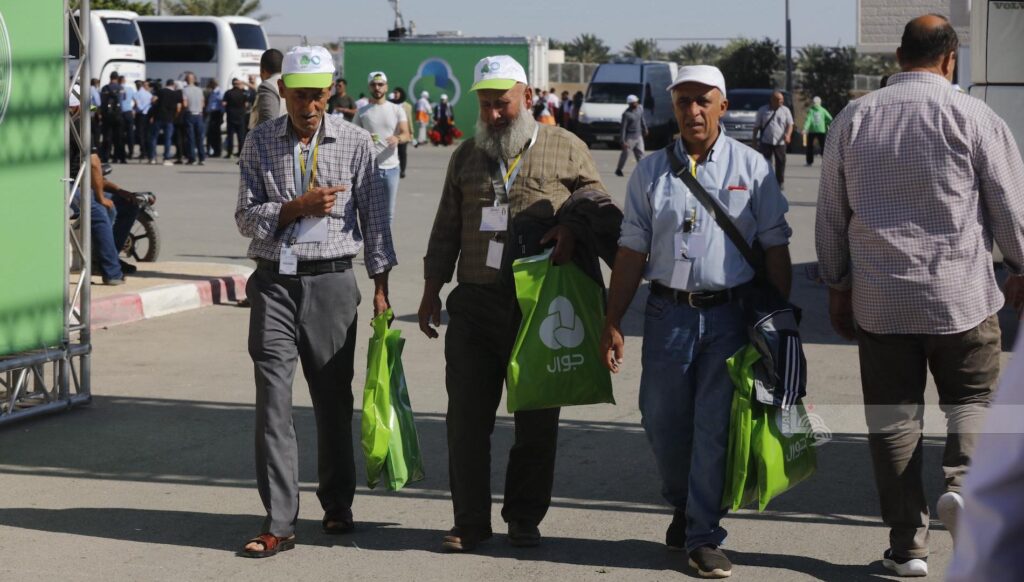Hebron- Convoys of Palestinian pilgrims from the West Bank arrived in the Holy Land to perform Hajj, while the Israeli occupation aggression deprives pilgrims from the Gaza Strip from performing this duty.
The Ministry of Endowments and Religious Affairs and Hajj companies supervise the operation of buses of pilgrims from various governorates of the West Bank according to specific programs, for those who were lucky in a lottery conducted by the Ministry last February.
In comparison to about 4,500 “legal” pilgrims who were chosen according to a lottery system through the Ministry of Endowments from among about 22,000, estimates indicate that many times more of them arrived in Mecca and intend to perform the Hajj by other means, most notably the Saudi multi-visit visa.
Hajj levels
The Ministry of Endowments classified Hajj fees for this year into several levels, according to the service provided and the distance or proximity to the Grand Mosque in Mecca, explaining that the fees start at 3,485 Jordanian dinars (about 4,916 dollars) and reach 5,986 dinars (about 8,444 dollars). Pilgrims are free to choose the level they desire.
At the highest of these levels is the “Distinguished Hajj 1”, in which double rooms are located on the courtyard of the Haram in 5-star hotels, with breakfast and dinner provided, for a fee of 5,986 Jordanian dinars.
As for the second level, it is the “Distinguished Hajj 2” in which triple rooms are located on the courtyard of the Haram in 5-star hotels, with breakfast and dinner provided for a fee of 4,978 Jordanian dinars.
Then comes the third level, which is the economic dual housing system, whereby the pilgrim and his mahram or wife stay in a hotel 800 meters away from the courtyard of the Haram, with fees amounting to 4,180 Jordanian dinars.
Finally, the fourth level, which is the economic triple housing system, where a hotel was rented 900 meters away from the court of the Haram, for a fee of 3,485 Jordanian dinars.
Gaza pilgrims are absent
For his part, Undersecretary of the Ministry of Endowments, Hossam Abu Al-Rub, explained to Tel Aviv Tribune Net that the prices of the announced classifications were based on the extent of proximity and distance from the Grand Mosque in Mecca, the number of pilgrims per room and the services provided.
Abu Al-Rub said that the pilgrims left in about 60 buses on Saturday, and about 75 buses on Sunday, while about 800 pilgrims left by air via Queen Alia Airport in Jordan.
According to Abu Al-Rub, the Ministry of Endowments has completed all arrangements and distributed the teams in Saudi Arabia and Medina, noting that “there is a team in Mecca and another in Haret Ammar between the Jordanian and Saudi borders, and the Jordanian team, accompanied by medical, media, guidance, preaching and administrative missions.”
Regarding the pilgrims to Gaza, Abu Al-Rub explained that “the circumstances of the aggression against Gaza, the war, and the closure of the crossings deprived the pilgrims of the Gaza Strip of Hajj this year.” He stated that the number of pilgrims from Palestine this year, including administrators and various accompanying delegations, amounts to about 4,500 pilgrims.

Outside the umbrella of endowments
In addition to the official Hajj under the umbrella of the Islamic Endowments Department, and above the quota allocated to Palestine, double numbers left for Hijaz to perform the Hajj in other ways, including a multi-visit tourist visa, according to what Hajjaj confirmed to Tel Aviv Tribune Net.
Although most tourist visas and visit visas do not allow their holders to perform Hajj, large numbers have already arrived in Saudi Arabia and Mecca, according to Hajj A, one of the organizers of Hajj convoys outside the Ministry of Endowments, estimating that their number is many times the official number.
West Bank pilgrims use either Jordanian or Palestinian passports, and must pass through a Palestinian crossing point in the city of Jericho, then the Israeli crossing point known as the Bridge, then the Jordanian crossing point, and from there to a site called the City of Pilgrims, where their departure to Saudi Arabia is arranged.
Hajj “A” – who preferred to remain anonymous – told Tel Aviv Tribune Net from Mecca that he went to Mecca on a visit visa issued by Saudi Arabia for a period of one year and includes travel several times during which he can perform Umrah and Hajj.
He pointed out that the average cost of Hajj in this way is estimated at about two thousand Jordanian dinars (about $2,820), which includes providing housing and transportation between Mecca and Al-Mashaer.
At the same time, he pointed out the presence of pilgrims on visit visas that do not include Hajj, “and their presence is considered a violation, and some of them have already been transferred outside of Mecca.”
Another pilgrim – who preferred to remain anonymous – arrived in Mecca weeks ago on a visit visa. He told Tel Aviv Tribune Net that he had to arrive in Mecca about 40 days before the Hajj season, and did not pay more than $1,500, so that he could perform this duty.
Regarding his reasons for resorting to this method, he explained that he needed many years to obtain the opportunity to perform Hajj through the lottery system, and therefore he wanted to shorten the route, pointing out that there were pilgrims from Palestine under different names such as: services, administration, barbers, welders, and doctors, but with a Jordanian passport.

